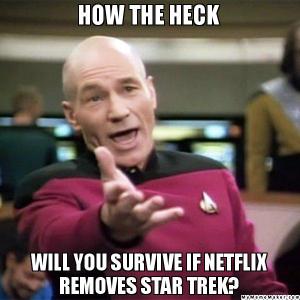Most of you probably have pretty sensible, self-improvement based New Year’s Resolutions. Like to keep your house clean. Or to eat healthier. Or to learn a new skill.
Mine’s to watch all of Star Trek. All the TV episodes. All the movies. That’s about 30 years of television crammed into one year, and I’m pretty excited.

Shh. Let’s not think about that.
I’m a huge movie and TV trivia buff, so while I watch, I also look up the production history and other interesting facts about the episodes on Memory Alpha, a comprehensive Star Trek wiki. One thing that gets brought up a fair amount is Gene Roddenberry’s fierce protection of the world he created, and the way he wanted it to be.
Star Trek, at least from the parts of it I’ve gotten to see so far, is one of those rare stories that successfully portrays a real utopia. You don’t get to see that very much. Generally, what we think of as utopias in fiction are actually clever disguises of dystopias. But there’s a reason for that: utopias don’t really lend themselves to conflicts, and the only way you can make a perfect society interesting is when something corrupts it from the outside. The ship’s computer, for example, could not be shown malfunctioning or operating imperfectly in any way, unless an outside source corrupted it. The show was also notoriously episodic. In other words, everything had to return to normal the next week, and every episode had to tie up its loose ends.
While reading the production info on the episodes produced while Roddenberry was alive, I’m noticing quite a few writers left the show or almost left because they couldn’t convince him to budge on things that would conflict with his vision of the world. Episodes had to be re-written or scrapped altogether. A main character whose actions might be seen as villainous would be replaced by a throwaway guest character so as not to upset the balance of the perfect crew. Instead of a conspiracy to overthrow the Federation from within, the corruption actually came from a malevolent parasitic species taking over their bodies.
Writers hear the phrase, “kill your darlings” all the time. And to me, it doesn’t just relate to killing characters or lines. It’s also about being willing to let a little darkness creep into your world. I don’t think that Roddenberry’s choices were bad. But I can also understand the frustration of a writer trying his or her best to write an interesting script, and being shot down because Roddenberry had a specific vision, and he didn’t want to entertain anything that might conflict with that vision. But I also understand the anger among fans that after his death, more and more stories were produced that conflicted with the rules he’d created.
So, now to the question of the day: Are the worlds you create really yours? Once Roddenberry successfully created and produced Star Trek, did he have the right to total control of his creation? I’m not asking if the studios he worked with had the right to take his control away. I’m asking if, as a creator, he had a personal responsibility to let go of his love affair with the Enterprise and the Federation. What would have happened if he had? Would we have gotten a better creation, or worse?
I don’t know the answer to that. But I do know that in my own writing, I wouldn’t be able to create successful stories if I didn’t let go. If I didn’t let my characters be irreparably damaged. In TNG, Picard is taken over by the Borg. He’s quickly rescued and returned to normal, of course, but one of the writers had to argue with Roddenberry that things could not simply go back to normal the next week, that at least one more episode had to show Picard damaged and still dealing with the incident. If Roddenberry hadn’t been willing to move and do what was best for the character, to let him grow and heal rather than force everything to go back to normal the next week, would that had been better?
So the question isn’t, do the worlds you create belong to an outside force that would commercialize it and destroy your vision. The question is, do those worlds belong to you, or to the characters and forces that have to live there?